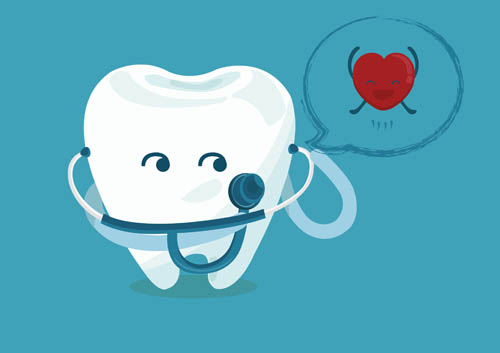Start Your Day Off with a (Healthy) Smile!
October 17th, 2025

If there’s one meal that can claim the title of “Sweetest Meal of the Day,” it’s almost certainly breakfast. Sugary cereals, syrup-covered waffles, oatmeal with honey, cinnamon toast (which is literally sugar poured on toast)—it’s hard to imagine another menu even coming close. But you’re trying to keep your diet as healthy as possible. What to do?
First, no need to deprive yourself of the occasional pastry or stack of pancakes. The real problem with breakfast isn’t so much sugar as it is added sugar.
- Just a Spoonful of Sugar? What’s So Bad About That?
Nothing! Many healthy foods have natural sugars. Milk contains lactose sugar, and it also contains calcium and is enriched with vitamin D—both of which are essential for strong bones and teeth. Fruits get their sweetness from a sugar called fructose, and deliciously provide vitamins, minerals, antioxidants, and fiber to our diets.
Even processed sugar is surprisingly low in calories. In fact, a teaspoon of white sugar has only about 15 calories. But this teaspoon is also rich in nutrients for cavity-causing bacteria. The oral bacteria in plaque use sugars and carbohydrates from food particles as a fuel source to produce acids. These acids erode enamel and lead to cavities.
Choosing breakfast foods without additional sugars, then, is an easy way to reduce the number of empty calories in your diet while safeguarding the health of your teeth. We have a few suggestions.
- Be Selective with Cereals
If the word “sugar” or “honey” or appears on the box, that’s a hint that your favorite cereal is heavy on the sugar. But there’s a more scientific way to tell just how much sugar is in that spoonful.
While the colorful packaging and playful mascots are eye-catching, check the black-and-white panel with nutritional facts found on every box. If one serving equals 27 grams, and the sugar in that serving equals 15 grams, you know you have a problem. And cereals marketed to children are especially “rich” in added sugar.
But luckily, you don’t need to give up your morning bowl. Many cold cereals are available that offer whole grains, protein, and fiber without a lot of added sugar. Spend some time in the cereal aisle comparing, or, to make life easier, there are many online sites which recommend the best (and worst) cereals in terms of sugar content.
- Use Your Judgment with Juices
Fruits are packed with important nutrients. Not only do they provide essential vitamins and minerals, they’re a great source of water and fiber. If you drink 100% fruit juice, you are getting the benefit of most of the vitamins and minerals found in fruit. (You’re also getting less of the fruit’s natural fiber, and more of the fruit’s natural sugar, so consider fresh fruit as an option occasionally.)
But when fruit juice comes with “cocktail,” or “punch,” or “ade” attached to the end of it, there’s often something else attached—added sugar. For natural fruit flavor and the least amount of sugar, stay with 100% unsweetened fruit juice.
- Search Out “Surprise” Sugars
Remember the childhood excitement of searching through your cereal box for the prize inside? Fun! What’s not so much fun? The surprises you might find when you search through the labels on your favorite breakfast items—because added sugars make their stealthy way into many of our morning favorites.
When you compare plain, Greek, and low-fat yogurts, for example, the low-fat options are often higher in added sugar. A container of low-fat yogurt can provide 19 grams of sugar—that’s a tablespoon and a half!
And while you’re at it, be sure to compare the sugar content in granola bars. Some are full of nuts and grains, and some are full of added sugar.
Going out for a breakfast smoothie? Those can contain 70 grams of sugar and more. Making your own at home might be a little more time-consuming, but if you use fresh fruit as your sweetener, you can make sure that what you’re not consuming is added sugar. If you’re on the go, check out all-fruit options at your favorite smoothie shop.
Drs. Peter Vogel, Vijal Vadecha and our team aren’t asking you to eliminate sugar from your breakfast diet altogether. (Everyone loves a doughnut now and again.) But substituting some alternatives for your regular menu choices can reduce the amount of added sugars by tablespoons every meal. That’s another great reason to greet the morning with a smile!
October Is Orthodontic Health Month!
October 17th, 2025

October’s here! A month when we celebrate the beauty of fall, the taste of pumpkin spice, the fun of Halloween in Anthem, and the healthy smiles which orthodontic treatment makes possible!
Because October is Orthodontic Health Month, and it’s a great time to talk about how your orthodontist helps you create not just a more beautiful smile, but a healthier one.
Straight, evenly spaced teeth are the visible benefit of treatment, but there are many health benefits which might not be quite as noticeable. Orthodontic treatment can:
- Help You Prevent Cavities and Gum Disease
When teeth are crowded or crooked, it’s hard for your toothbrush and floss to reach all of the plaque which builds up on and between your teeth. The bacteria in plaque create acids which start to dissolve tooth enamel. And a very small hole in the enamel surface can grow until it becomes a cavity.
Plaque and bacteria also irritate the gums. When you can’t remove plaque completely, your gums are at risk for gingivitis. This early stage of gum disease causes redness, tenderness, swelling, and bleeding. Left untreated, gingivitis can develop into more serious gum disease.
And, over time, plaque hardens and becomes tartar, which needs to be removed professionally at Daisy Mountain Dentistry.
When your teeth are straight and evenly spaced, brushing and flossing are both easier and more effective, helping you keep your teeth and gums healthy and plaque-free.
- Create a Better Bite
For a healthy bite, your teeth and jaws need to align correctly. The top teeth should slightly overlap the lower teeth, and the ridges of your upper molars should fit smoothly with the grooves of your lower molars.
Malocclusions, or bad bites, can come in many forms, including overbites, underbites, open bites, cross bites, and overjets. A bad bite is bad for your dental health. Malocclusions can cause tooth grinding, worn enamel, and even cracked teeth.
And bad bites don’t just affect your teeth. When your bite doesn’t align properly, you might suffer from problems such as headaches, jaw pain, indigestion, and sleep apnea.
Orthodontic treatment creates a healthy, symmetrical, and pain-free bite.
- Improve Your Self-Confidence
We can’t forget the invisible health benefits of orthodontic treatment! Your smile is a gift which you share with the world. But if you’re hesitating to smile because of self-consciousness about your teeth or bite, orthodontic treatment can make a world of difference.
Your orthodontist can help you achieve straighter teeth, a bite which fits together properly, and, when malocclusions affect jaw symmetry, a more balanced facial profile. If you’re concerned about the appearance of your smile, talk to Drs. Peter Vogel, Vijal Vadecha about an orthodontic consultation. Today’s technology can even let you see what your future smile will look like!
Modern orthodontic treatment is more effective and takes less time to complete than ever before. And orthodontics offers patients of all ages more benefits than ever before:
- New types of braces are less noticeable and more comfortable than older styles. Smaller brackets, brackets which blend with tooth enamel, clear aligners, and lingual braces give you a variety of options to customize your treatment.
- Early orthodontic treatment can guide jaw growth in younger children.
- Appliances can help with jaw alignment in older children, or, for more serious malocclusions, an orthodontist can coordinate treatment with an oral surgeon.
- Treatment isn’t limited to the teen years. Adults make up a large and growing number of orthodontic patients.
If you’ve been considering orthodontic treatment, October—or any month!—is a great time to schedule a visit with an orthodontist. An orthodontic evaluation will let you know just what your orthodontist can do to help you create a beautiful and healthy smile.
Anemia and Your Oral Health
September 24th, 2025

One of the most common clues that you might have anemia is found in your smile. If you’ve noticed that your gums are suddenly paler than they used to be, it could be a sign that you’re anemic. What does this mean for your general health—and your oral health?
There are several types of anemia, which have can be caused by different medical conditions and which can cause different symptoms. The most common form of anemia, and one of the most easily treated, is iron-deficiency anemia.
Iron is essential to our health. Why? It’s all about the red blood cells. First, some biology.
Every cell in your body needs energy to live and to function. Cells get this energy from the foods we eat, which are broken down into a simple sugar called glucose. Glucose molecules are transported by our blood cells to reach all parts of the body. But that’s only the first step.
Energy is released into the cells when the chemical bonds holding glucose molecules together are broken. And this requires oxygen. Once inside our cells, glucose and oxygen react, breaking the chemical bonds of the glucose molecules, reconfiguring their atoms to create carbon dioxide and water byproducts—and releasing energy into a form your cells can use.
So, how do we move this oxygen from our lungs to our cells to start the process? That would be our red blood cells again. But this process can’t happen without adequate iron. More biology!
Red blood cells contain a protein called hemoglobin, and hemoglobin contains iron. In fact, well over half of the iron in our body is found in our red bloods cells. And here’s the key to iron’s importance: iron attracts oxygen molecules.
Hemoglobin picks up oxygen in our lungs and delivers it throughout the body, where it becomes glucose’s essential partner in fueling our cells. Without enough iron, your body won’t be able to create the red blood cells it needs so that all of your cells, tissues, and organs can get the oxygen they need to function efficiently.
When might you suspect that you’re anemic? Your gums, the lining of the mouth, the inside of your lower eyelids, and your skin can take on a paler hue—the classic sign of anemia. But other symptoms which you might not necessarily associate with anemia are also common, including:
- Fatigue
- Heart palpitations
- Cold hands and feet
- Dizziness
- Irritability
- Difficulty Concentrating
- Pica (the desire to eat non-food items)
And because anemia affects the whole body, your oral health isn’t immune. It’s not just a matter of pale gums. Iron deficiencies can cause:
- Sores and ulcers in the mouth
- Cracks on the sides of the mouth
- Pain, redness, and/or swelling of the tongue
- Loss of papillae (those little bumps on your tongue which hold your taste buds)
- Tooth damage caused by pica
- Dry mouth, which increases your risk for cavities, gum disease, oral infections, and bad breath
Iron-deficiency anemia can have several causes, among them insufficient iron in the diet, medical conditions which cause bleeding (such as ulcers), heavy menstruation, pregnancy, or growth spurts in children and teenagers. Treatment will depend on the cause of your anemia. It might be as simple as a change in diet or an iron supplement, or it might require further treatment options. Do consult with Drs. Peter Vogel, Vijal Vadecha before taking iron supplements, as too much iron causes iron toxicity, which can be very dangerous.
If Drs. Peter Vogel, Vijal Vadecha and our team suggest that you might be anemic, or if you notice changes you think might be caused by anemia, see your physician for a simple blood test. Besides iron-deficiency anemia, there are other forms of anemia and other diseases which can mimic these symptoms, so it’s important to get a doctor’s diagnosis. If you have been diagnosed with anemia, let our Anthem dental team know.
One last “if”: If you do have iron-deficiency anemia, don’t delay treatment. The sooner your red bloods cells are back at their peak, the sooner you—and your gums—will be back in the pink!
Oral Health Problems: An indicator of overall health problems?
September 17th, 2025

If you are like many people, you might think of your oral health as separate from your overall health. After all, most dental coverage plans are distinct from health care coverage. However, your oral health goes far beyond being able to chew nutritious and enjoyable foods. Oral health problems may be an indicator of a variety of other health problems.
Links between Oral Health and Overall Health
In the late 1980s, researchers noticed a trend among patients who had recently suffered from heart attacks. As the Journal of the American Dental Association reported, they observed that these patients were more likely to have dental caries or cavities, periodontitis or inflammation around the tooth, and other forms of gum disease. Later studies found similar results, and dentists and doctors now recognize poor oral health as a risk factor for a variety of heart conditions, such as heart attacks, atherosclerosis, and coronary heart disease.
There are even more links between oral health problems and overall health problems. Some individuals do not find out that they have Type 2 diabetes until a dentist sees that they have periodontitis. If you have diabetes, worsening periodontitis can indicate that your diabetes is not under control.
Poor oral health is also associated with rheumatoid arthritis. Furthermore, poor oral health puts you at higher risk for respiratory infections, such as pneumonia, because harmful pathogens can enter your body through your mouth.
Take Care of Your Teeth
Keeping your teeth healthy remains important, especially as you grow older. Older adults are more prone to dental caries and other oral health problems, as well as to chronic diseases. While taking care of your oral health might not prevent a specific disease, a healthy mouth is a significant factor in your overall health.
You can take care of your teeth by continuing to brush twice a day and floss every day. Avoid consuming too many sugary and starchy foods, and drink water after each meal or snack to rinse your teeth. See Drs. Peter Vogel, Vijal Vadecha for regular checkups, and contact Daisy Mountain Dentistry if you have any concerns about your teeth or gums.


